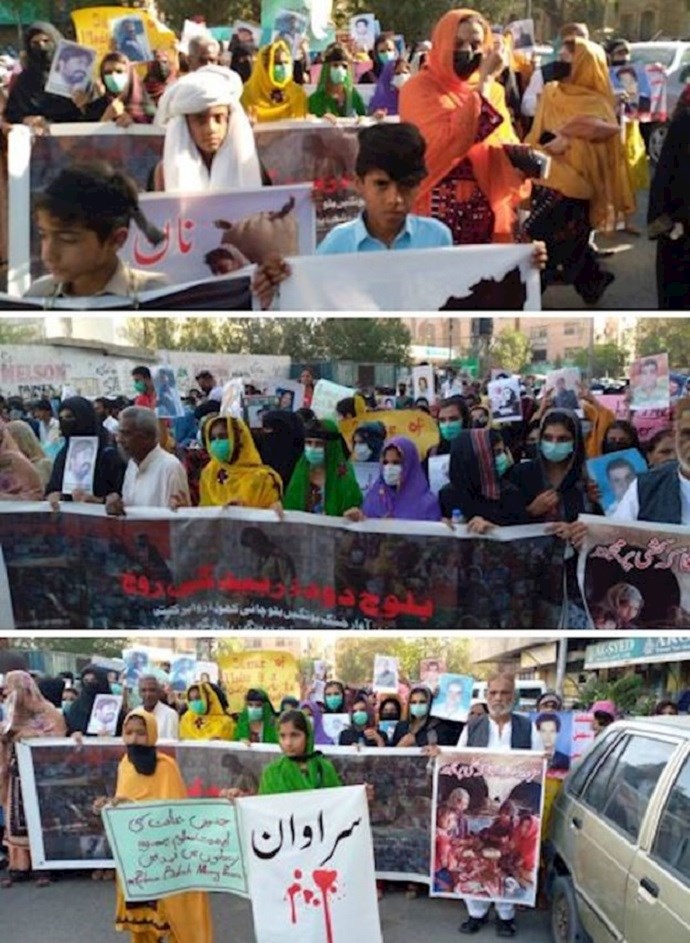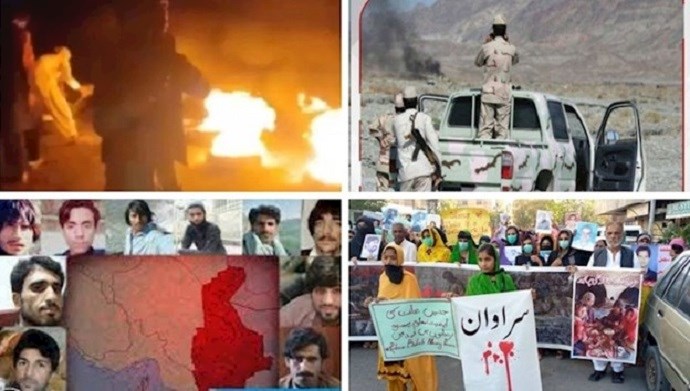Reporting by PMOI/MEK
Iran, March 4, 2021—Protests that began in Iran’s Sistan and Baluchestan province on February 22 continued on Wednesday despite heavy security measures by the regime. In Zehkolut, protesters blocked the road to Rudbar, preventing security forces from commuting to quell protests in other areas. The regime has been calling for reinforcements from neighboring provinces and uses these roads to transfer them to locations where demonstrations are taking place.
In Nik Shahr, the people lit fires and blocked roads used by security forces. In the town of Sarbaz, the people blocked the road from Iranshahr to Sarbaz. The road from Gandavak to Jakigur had also been blocked by protesters.
In the town of Mehrestan, the locals have reported that security forces are randomly firing bird shots to intimidate the citizens and prevent protests.
Protests began in Saravan, near the Iran-Pakistan border, after the Revolutionary Guards (IRGC) opened fire and killed fuel porters in Saravan county. Images and videos posted on social media showed dense presence of IRGC forces along with heavy artillery and tanks.
Protests have spread across the Sistan and Baluchestan province since the incident. The regime has been regularly cutting off internet access to prevent the news of the protests from spreading. According to reports obtained from the locals, security forces have gunned down dozens of protesters and have arrested many others.
For many of the impoverished people of Sistan and Baluchestan, transferring small amounts of fuel across the border and selling it to customers has become the only means of earning their keep and supporting their families. The reason they live this way is more than four decades of regime corruption and discrimination against the Baluch minority. The regime’s security forces attack and kill them regularly under the pretext of fighting smuggling. Meanwhile, the regime’s own security forces control a huge fuel-smuggling network that dwarfs the activities of the fuel porters of Sistan and Baluchestan.
Since the protests began, there has been an outpouring of support for the Baluch people and condemnation of the crimes committed by the regime.
In a statement published on Tuesday, Amnesty International called for an independent investigation into the killing of the fuel porters of Baluchestan.
“By opening fire on a group of unarmed people, Iranian security forces have displayed a callous disregard for human life. There must be urgent, independent criminal investigations into these unlawful killings, in line with international law and standards. Anyone against whom there is sufficient admissible evidence must be prosecuted in a fair trial, without resorting to the death penalty,” said Diana Eltahawy, Deputy Director for the Middle East and North Africa at Amnesty International.
Amnesty also called on the international community to take action on the human rights violations committed by the Iranian regime against Baluch fuel porters.
Given the systematic impunity in Iran for serious human rights violations and other crimes under international law, members of the international community must push for truth and justice for the grave violations of the right to life committed by Iran’s security forces on 22 Feb
— Amnesty Iran (@AmnestyIran) March 2, 2021
In the Pakistani city of Karachi, near the Iran-Pakistan border, a large group of citizens held a rally in support of Baluch protesters and in condemnation of the Iranian regime’s killing of fuel porters and demonstrators.

Rally in Karachi, Pakistan, in support of Iranian Baluch minorities
State-run media warn of aftermath of Saravan protests
The state-run daily Mostaghel described the events in Sistan and Baluchestan province as “fire under ashes” and warned on March 3 that similar events might happen in other places: “Instead of looking at the issue from a legal and humanitarian perspective and examine what has led to us having porters in Kurdistan and fuel porters in Baluchestan, the government has opened fire on these people. By cutting off the internet for several days or weeks, the issue will not be forgotten and will remain as fire under ashes. If there’s no decisive will to solve the problems in collaboration with the people, the same issue will crop up again in some other place and in another shape.”
Mostaghel further acknowledged the discrimination against the Baluch people and wrote, “The main problem of Baluchestan and particularly Saravan is that, 42 years after the revolution, we have not been able to provide the people of this region with the credit they deserve and they are not being treated humanely. The Saravan issue was an old wound that opened and the people became aware of the reality of that region.”





